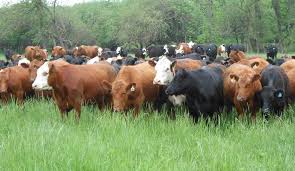记忆方法
记住“cattle”的方法是联想其拼写和意义。可以将“cattle”想象为“cat”加上“tle”,就像猫群一样,因此“cattle”指的是牛群。或者可以联想牛的角和尾巴(想象成“tle”的形状),这样就能记住这个词表示的是牛这一动物群体。
以上内容由AI生成, 仅供参考和借鉴
中文词源
cattle 菜牛
来自capital, 资产,资本,因牛在农耕社会有着无比重要的作用而引申此词义。比较castor,海狸。
英语词源
- cattle
-
cattle: [13] Ultimately, cattle is the same word as chattel [13], and when it first entered English it had the same meaning, ‘property’. From earliest times, however, it was applied specifically to livestock thought of as property. In the Middle Ages it was a wide-ranging term in animal husbandry, being used for horses, sheep, pigs, and even poultry and bees, as well as cows, and such usages survived dialectally until comparatively recently, but from the mid 16th century onwards there is increasing evidence of the word’s being restricted solely to cows.
Its ultimate source is medieval Latin capitāle ‘property’, which came to English via Old French chatel as chattel and via Anglo-Norman catel as cattle. Capitāle itself goes back to classical Latin capitālis (from caput ‘head’), from which English gets capital.
=> capital, chattel - cattle (n.)
- mid-13c., "property," from Anglo-French catel "property" (Old North French catel, Old French chatel), from Medieval Latin capitale "property, stock," noun use of neuter of Latin adjective capitalis "principal, chief" (see capital (n.1)). Compare sense development of fee, pecuniary. Sense originally was of movable property, especially livestock; it began to be limited to "cows and bulls" from late 16c.
权威例句
- 1. The old stone cattle trough still sits by the main entrance.
- 陈旧的石制牛食槽仍然放在大门口。
- 2. Outside, two old boys lingered on the street corner discussing cattle.
- 两个老头儿在外面街角迟迟不走,聊着牛的事情。
- 3. Cowboys drove covered wagons and rode horses, lassoing cattle.
- 牛仔们有的赶着大篷车,有的骑着马,抛套索捕牛。
- 4. He had sought work as a cowboy, rounding up cattle.
- 他找了一份放牛的差事,负责把牛赶到一起。
- 5. I run a cattle station some miles up-country.
- 我在北边几英里开外的地方有一个养牛场。
